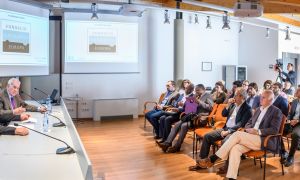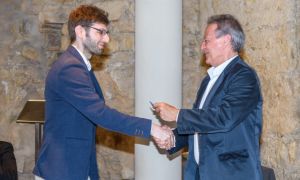Last Friday, May 12, the Catalonia Europe Foundation held its fourth annual convention at the Castle of Castellet i la Gornal with the presence of guests Miguel Ángel Moratinos, Minister of Foreign Affairs and Cooperation between 2004 and 2010 and Carles Casajuana, Spanish diplomat and Writer.
The president of the FCE, Ernest Maragall, opened the convention by thanking all the participants and attendees for their presence, in the Abertis Foundation the transfer of the Castellet Castle space, and to the Banco Sabadell Foundation for their collaboration and financing of the "Catalonia Europa s XXI "one more year.
Francesc Colomé, member of the Foundation's executive committee, then summarized the projects in which the foundation participates today: the "Pasqual Margall Legacy" research line, the organization of a series of conferences within the project on inequality as a major global challenge with representatives of civil society (companies, organizations, citizens, etc.). Also within the framework of projects of the Erasmus + program of the European Union, the FCE is involved in the European mobility project for vocational training students. Likewise, the foundation has worked in depth in the study of the SPI indicator utilities in Catalonia and is carrying out diverse assignments both in the economic axis, in cities and in transparency and democratic quality.
Antoni Castells, president of the advisory board of the FCE, gave way to the award of the award to the researcher Albert Guasch, praising the rigor and scope with which the award-winner presents and analyzes the issue of Eurobonds and the possible future scenarios of the policy monetary policy of the European Union.
Albert Guasch holds a degree in Journalism and a master's degree in European Integration Studies from the UAB. Co-founder and president of the think-tank "European Horizons". Your work "An EU Treasury with Eurobonds: would it bring financial stability?" Part of the thesis that the euro zone is incomplete. The search for Guasch makes a review of the past of the Eurozone to then propose possible alternative scenarios for the monetary and fiscal policy of the European Union. Guasch thanked the FCE for making possible, through this recognition, the task of a part of civil society that strives to defend the European project. He also thanked the participation of the Banco Sabadell Foundation in this recognition.
Next, the president of the FCE gave way to Miguel Ángel Moratinos and Carles Casajuana who gave their opinion on the situation of the European Union today, mentioning in his evaluations the recent election of the proclaimed pro-European and new president of France, Emmanuel Macron. Casajuana initiated the dialogue affirming that the establishment of the monetary union as the first tangible embodiment of the EU as a supranational structure was an error. The European project should have started from a fiscal and political union and then continue with the monetary union, common and equal; without disparities between the member states. Therefore, the European institutions and the Member States must urgently unclog, reform and complete the European project through fiscal union, political union and bringing institutions closer to citizens.
Moratinos recalled that the main reason for the construction of Europe was to ensure the permanence of peace - to establish - as a status quo. The word peace seems to be obsolete because of modesty or outdated, when in reality it is a word that must be kept in mind in today's world. He valued the election of Macron and was in favor of the common leadership of the two main European powers, France and Germany, but provided that this leadership includes a common front with the other member states. Moratinos concluded by saying that despite the difficulties surrounding the EU, the conquered terrain should not be underestimated. The European Union that we have surely surpasses the expectations imagined by its founding fathers.
Speakers and speakers agreed on the unquestionable need to reform Europe. In sum, there is a new story for Europe. This story must include, on the one hand, the recognition of the errors of the austerity policies and, on the other, the possibility of changing the rules of the European democratic game. This alternative must be considered, and especially practiced, both by the political parties of the Member States and by independent politicians and civil movements. All of them can play a key role in achieving an integrating, egalitarian and solidary Europe that ends up being the strongest Europe in its history.











